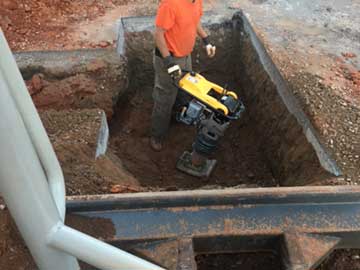
If you bought a home in a rural part of Georgia, then you have probably been using well water for all your water needs.
But with all the growth in Georgia – your once “rural” home may now be in what seems like suburbia and along with that – you may now have the option to switch over to city water.
If this is the case – should you switch?
What’s The Difference Between City Water and Well Water?
There are certainly a few differences between the two types of water as well as advantages and dis-advantages:
Well Water
1. Well water is basically untreated groundwater. Rain water soaks into the ground and gets collected in an aquifier (which is a layer of permeable rocks underground). A pump system is installed to pump the water from the aquifier into your home.
2. Generally speaking, well water is hard water so a water softener is recommended for homes that use well water.
3. Well water has an odor to it and it also causes stains, mostly due to high iron content. Oftentimes, you will need an iron filtration system installed in order to avoid those ugly orange stains in your sinks, bathtub, shower and toilets from the iron in your well water.
4. Because well water is not treated, it can end up being contaminated. This is not always the case of course, but it’s important to know that it’s possible. And if there’s been a lot of construction in your area – your well water may be more contaminated today than it was a year ago.
5. The EPA recommends that anyone using well water must have their water tested at least once a year for E. coli and coliform bacteria (at least these two tests).
6. Because it’s your own private well – you don’t have to worry about problems with water pipes breaking down that are not on your property (like you do with city water).
7. Oftentimes, using well water will cost you less than using city water.
City Water
1. The Atlanta, Georgia area and it’s surrounding suburbs get their water from Lake Lanier which then feeds that water into the Chattahoochee River. Because there are so many contaminants in these bodies of water – city water must go through cleaning procedures and be chemically treated.
2. Fluoride and chlorine are two chemicals added to the water. Not everyone is comfortable with these additions.
3. City water may have an unpleasant odor and/or smell due to the use of these chemicals.
4. You are dependent on the city to maintain their pipes. If a problems occurs anywhere in that large piping system it can affect you leaving you with no water or no clean water, etc.
5. There is a monthly charge for the amount of water that you use and some cities have limitations on what you can use (especially if there is a drought). So, generally speaking using city water is more expensive than well water.
Is Well Water Safer Than City Water?
Depending on where you live and the type of soil in your area – well water is usually safer than city water as far as the number of contaminants that can be found in the water.
After all, city water must be treated with chemicals in order to be safe to be consumed and used and some individuals may not want to consume ANY chemicals or their bodies may have an unhealthy reaction to any of the chemicals used in the treatment process.
But – if there are contaminants in the ground where well water is being extracted from – then that water can certainly be contaminated.
That is why the EPA recommends a yearly test of your well water at least once a year.
Both city water and well water have to go through some type of pipe in order to get into your home and both have the potential to be contaminated if any of the pipe that they move through is corroded or rusted, etc.
Of course, if this happens with city water – the homeowner has little control over the situation whereas if this happens with well water – the homeowner can certainly fix the problem.
How Much Does It Cost To Connect To City Water?
If you’ve decided that you want to change from well water to city water, you’ll want to know what costs are involved.
Costs will vary depending on the size of the project involved. But we can give you an idea of what’s involved and what those costs range.
1. If you do not have a water main running from your home down to the city’s main water main – then that would have to be installed. The cost can range anywhere from $60 to $150 per foot.
2. A water meter has to be installed and this requires permits. This could range anywhere from $1500 to $3000.
3. If there are any problems with the installation of any piping (such as large trees or rocks that must be removed) then those would be additional costs.
If you have any questions about your water supply, call Atlantis Plumbing today at 770-505-8570. We are available 24 hours a day, 7 days a week.